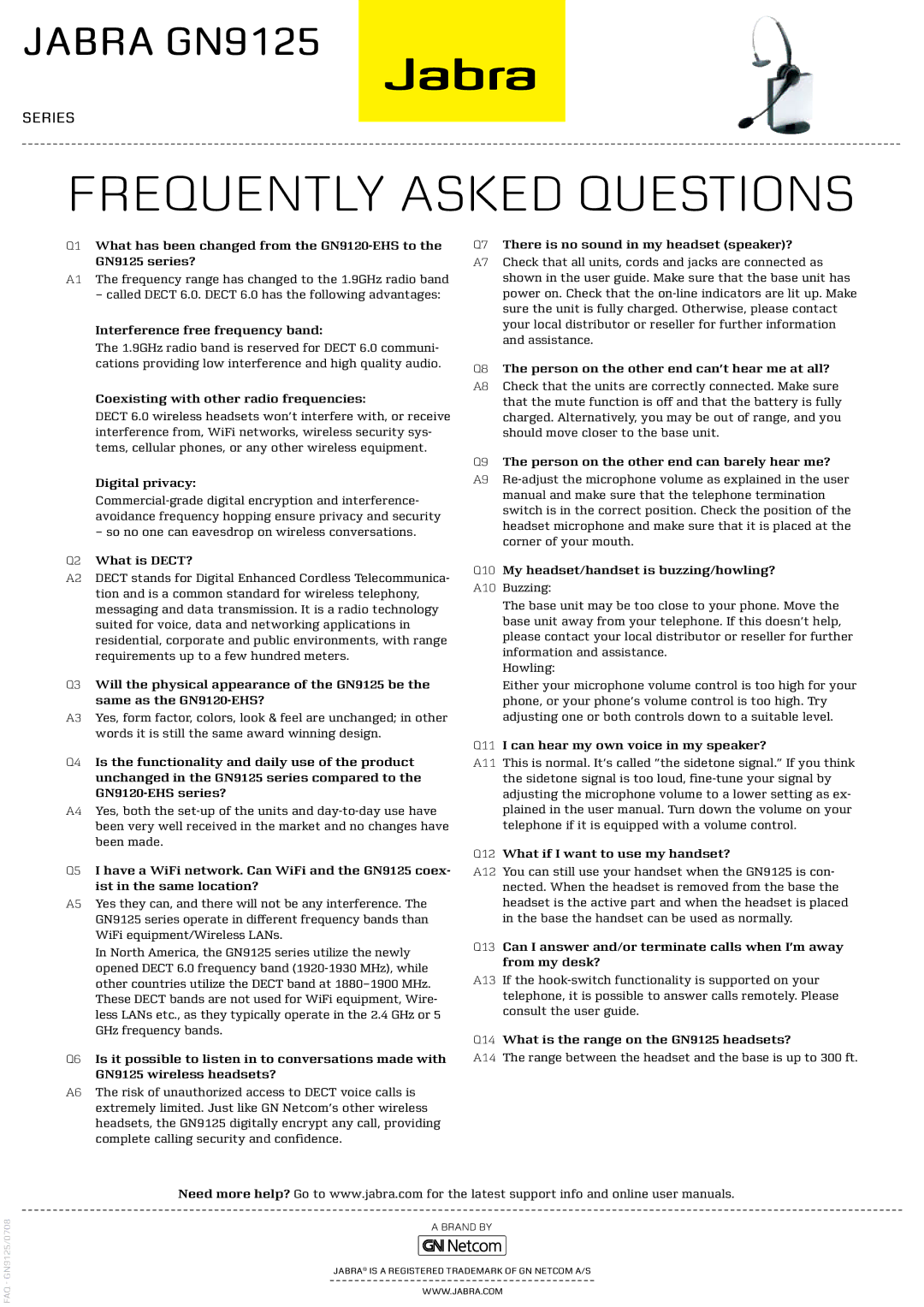
Jabra GN9125
SERIES
Frequently asked questions
Q1 What has been changed from the
GN9125 series?
A1 The frequency range has changed to the 1.9GHz radio band
– called DECT 6.0. DECT 6.0 has the following advantages:
Interference free frequency band:
The 1.9GHz radio band is reserved for DECT 6.0 communi- cations providing low interference and high quality audio.
Coexisting with other radio frequencies:
DECT 6.0 wireless headsets won’t interfere with, or receive interference from, WiFi networks, wireless security sys- tems, cellular phones, or any other wireless equipment.
Digital privacy:
– so no one can eavesdrop on wireless conversations.
Q2 What is DECT?
A2 DECT stands for Digital Enhanced Cordless Telecommunica-
tion and is a common standard for wireless telephony, messaging and data transmission. It is a radio technology suited for voice, data and networking applications in residential, corporate and public environments, with range requirements up to a few hundred meters.
Q3 Will the physical appearance of the GN9125 be the same as the
A3 Yes, form factor, colors, look & feel are unchanged; in other words it is still the same award winning design.
Q4 Is the functionality and daily use of the product unchanged in the GN9125 series compared to the
A4 Yes, both the
Q5 I have a WiFi network. Can WiFi and the GN9125 coex- ist in the same location?
A5 Yes they can, and there will not be any interference. The GN9125 series operate in different frequency bands than WiFi equipment/Wireless LANs.
In North America, the GN9125 series utilize the newly opened DECT 6.0 frequency band
Q6 Is it possible to listen in to conversations made with
GN9125 wireless headsets?
A6 The risk of unauthorized access to DECT voice calls is extremely limited. Just like GN Netcom’s other wireless headsets, the GN9125 digitally encrypt any call, providing complete calling security and confidence.
Q7 There is no sound in my headset (speaker)?
A7 Check that all units, cords and jacks are connected as shown in the user guide. Make sure that the base unit has power on. Check that the
Q8 The person on the other end can’t hear me at all?
A8 Check that the units are correctly connected. Make sure that the mute function is off and that the battery is fully charged. Alternatively, you may be out of range, and you should move closer to the base unit.
Q9 The person on the other end can barely hear me?
A9
Q10 My headset/handset is buzzing/howling?
A10 Buzzing:
The base unit may be too close to your phone. Move the base unit away from your telephone. If this doesn’t help, please contact your local distributor or reseller for further information and assistance.
Howling:
Either your microphone volume control is too high for your phone, or your phone’s volume control is too high. Try adjusting one or both controls down to a suitable level.
Q11 I can hear my own voice in my speaker?
A11 This is normal. It’s called ”the sidetone signal.” If you think the sidetone signal is too loud,
Q12 What if I want to use my handset?
A12 You can still use your handset when the GN9125 is con- nected. When the headset is removed from the base the headset is the active part and when the headset is placed in the base the handset can be used as normally.
Q13 Can I answer and/or terminate calls when I’m away from my desk?
A13 If the
Q14 What is the range on the GN9125 headsets?
A14 The range between the headset and the base is up to 300 ft.
Need more help? Go to www.jabra.com for the latest support info and online user manuals.
FAQ - GN9125/0708
Jabra® is a registered trademark of GN Netcom A/S
www.jabra.com
